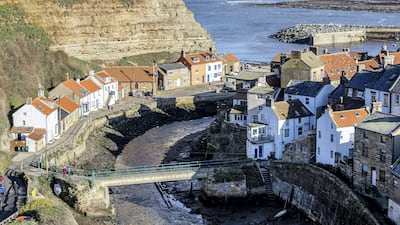Climate change will destroy historic sites along England’s northern coast, a heritage report has found.
The Celebrating Our Distinctive Heritage report, which was published on Tuesday, said parts of Yorkshire’s coastline “cannot be saved” from the effects of flooding and rising sea levels.
Yorkshire has Europe’s fastest eroding coastline and the latest research showed about 10 metres of land was lost to the sea in 2019 – more than double the average rate for the area.
More than 30 villages dating back to Roman times, including Out Newton, Dimlington and Monkwike, have now disappeared.
The report, commissioned by the York and North Yorkshire Local Enterprise Partnership and Historic England, said the area was extremely vulnerable to erosion.
“Exposed to time and tide, the area’s coastline, especially that from Flamborough to Spurn Head, is some of the most dynamic and vulnerable to erosion in the country,” it said.
“The effects of climate change, in the form of sea level rise and increased frequency and intensity of storm events, are likely to take their toll on coastal heritage and communities alike.

“It is a sad fact that much of the region’s heritage at risk from the effects of climate change and coastal erosion cannot be saved from the sea.
“It can, however, be recorded, understood and celebrated before the inevitable occurs.”
The report said planning was needed to manage the problem.
It recommended that officials work with the Environment Agency “to understand the need for, and impacts of likely scenarios for climate change and the necessary flood management responses”.
“There is a need to engage local people with the scale of the threat, and ensure that stakeholders are actively planning to manage risks and capitalise on interest,” it said.
“The sheer scale of Scarborough and Bridlington’s resort heritage creates substantial management challenges, and many assets have already moved into other uses.
“While any positive reuse is to be encouraged, ensuring that places retain their character is critical – given its importance both to the classic seaside experience, and to the development of new markets.”
It is not only coastal areas that are under threat, the historic city of York, famous for its Viking heritage, is also at risk.
In recent years it has repeatedly suffered from major flooding.
“As a city already susceptible to major flooding, the effects of climate change are a particular concern – contributing to more frequent, and more intense, severe weather events,” the report said.
“This poses a critical risk to riverside heritage assets, both in terms of direct impacts from floodwaters and debris, and also the potential need to enhance flood defences in future.

“There are clearly risks associated with any approach to adapting to climate change. However, the benefits associated with securing York’s heritage and communities are likely to outweigh effects on upstream heritage assets.
"Indeed, this could present an opportunity for extensive research and enhanced understanding, but at the cost of the potential for physical harm.”
Helen Simpson, chairwoman of the York and North Yorkshire Local Enterprise Partnership, said the report was a “call for action”.
“This report can be used as a blueprint, both locally and beyond, for levelling-up heritage, creating a better understanding and appreciation of the region’s historic environment, attracting investment and ensuring that heritage priorities are reflected in stakeholders’ plans and delivery actions,” she said.
“We see it as a call to action for thinking and acting differently about our heritage and our places.”
In 2019, a report commissioned by East Riding Council said “nothing could be done” to prevent erosion of the Yorkshire coastline.
It said a "single erosion event“ could put 24 properties at imminent risk within the next year – and more than 200 homes were expected to be lost in the coming decades.
The UK government has no policy for providing sea defences for smaller areas, which means more of Yorkshire’s coastal villages will eventually be lost to the sea.


